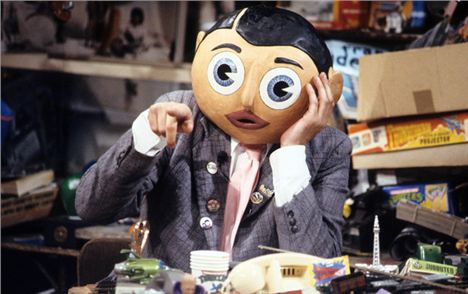MORRISSEY once said,"Artists aren't really people. I'm actually 40 per cent papier-mâché."
While not entirely true, being more like 40% quiff, it could be applied literally to eccentric, cult entertainer Frank Sidebottom and his oversized noggin.
There’s a niggling concern that once you take away the papier-mâché head there’s little about Frank that relates back to Sievey.
The alter ego of comedian and musician Chris Sievey, Frank Sidebottom emerged in the mid-80s as an aspiring pop star with a nasally Mancunian accent who rarely removed himself from his humble beginnings; He still lived with his mum, roamed the streets of Timperley and supported Altrincham FC.
A jack of all trades, Sidebottom made his name on radio, television with his Fantastic Shed Show and musically with his Oh Blimey Big Band before falling into obscurity in the noughties.
His surreal brand of haphazard entertainment enjoyed a renaissance before Sievey’s untimely passing in 2010, paving the way for his legacy to be survived.
Starring a protagonist with a papier-mâché head who plays bizarre, divisive music and co-written by former Sidebottom bandmate Jon Ronson, Frank would appear to be the definitive story of the mercurial genius-come-lunatic, except that this is not about Frank Sidebottom or Chris Sievey.
 Sievey's original Frank Sidebottom
Sievey's original Frank Sidebottom
Instead the film’s Frank, played by Hollywood star Michael Fassbender, is an American musician who, unlike Sievey, never takes off his unnervingly large papier-mâché head and being from Bluff, Kansas, has no connection with Timperley.
In an unsubtle nod to Jon Ronson, Jon played by Domhnall Gleeson, a flailing musician trapped in a nine-to-five job in a seaside town (that they forgot to close down) is offered the opportunity of a lifetime when unpronounceable band Soronprfbs stroll into town in search of a new keyboard player.
The timid youngster unknowingly walks into the mad world of Frank, the band’s perplexing lead man, and sets about helping to record the greatest album ever along with exposing Frank’s genius to the wider world, much too fellow band member’s dismay.
As Jon’s musical potential awakens, Frank orders him to squawk like a bird during rehearsals, so does his awareness of the bands’ underlying mental health issues.
It’s like some bizarre parallel universe offering of what Frank Sidebottom could have been, a misunderstood musical prodigy instead of the tongue-in-cheek novelty of his Timperley-based self. Rather than a biographical account, Frank is merely influenced by the original.
This is ultimately Frank’s downfall, the film is straddling two narratives: a wholly new one forged out of Jon Ronson’s script and the Sievey's original invention.
It means the film ends up being neither here nor there.
This failure to find its tone or narrative direction permeates all areas of the film. There are conflicts between a serious commentary on mental illness and a comedy of absurdities.
The first half of the film takes a light-hearted tone, balancing comedy and absurdity as Jon takes the bold step of abandoning his safe home reality in search of fortune and fame, albeit via the unconventional and bizarre sound of Frank’s band. The laughs are more sniggers than belly laughs, nevertheless, it’s enjoyable, wacky fun.
The latter section takes a much darker twist and tone, attributing the band’s quirks to a series of mental health problems, epitomised by Frank and his unwavering need to keep on the papier-mâché head.
Amongst all the comedy the stark, grim nature of mental illness feels out of place, it’s hard to feel for Frank’s emotional wellbeing when he’s a constant source of entertainment throughout. It’s an attempt at depth and emotional weight, but ones that falls flat.
There’s a niggling concern that once you take away the papier-mâché head there’s little about Frank that relates back to Sievey. Modern applications of Twitter and trendy music festival South by Southwest along with the use of Jon Ronson feels like an exploitation of Sidebottom’s name, not an appropriate tribute or examination.
The endearingly grounded nature of Sidebottom, the fact he never was a household name (outside a generation) beyond Manchester, let alone the world, has been lost in Frank.
The whimsical, English eccentricities of Sidebottom have been replaced by a fine, enjoyable film that fails to offer serious drama or insight into Sievey’s character, or the man behind the mask. Frank never promised to be about Sidebottom, but it promises little else either as a result.
Alternatively, aiming for a summer release is documentary Being Frank, an interview heavy, fan-funded and thorough insight into Chris Sievey’s life. For those intrigued about the man and the legend this is likely to fulfil your needs far better than Frank.
In cinemas now.
Follow @JSmithy64











